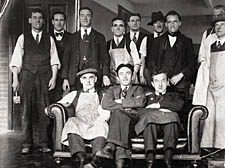|
|
 |
| |

‘The Old Manor Gang’: Patients and staff at the Old Manor Mental Hospital, Salisbury, in the early 1930s |
The bitter legacy of a less merciful age
Peter Barnham’s book on the plight of those ‘lunatics’ suffering shell shock in the Great War makes for harrowing reading, writes Piers Plowright
Forgotten Lunatics of the Great War
by Peter Barham
WE know the Wilfred Owen poems; we know Siegfried Sassoon’s account of what happens to officers driven mad in the trenches; but we know nothing about the fate of Private George Gomm or Private Albert Norris admitted to Long Grove Asylum Surrey, a home for “pauper lunatics”, in the summer of 1916. Or of Gunner Benjamin Braines, the first man to use the words “shell shock”, and returned to his unit as fit for service, after a brief stay in a mental hospital.
Or of Sapper Gilbert Bowles, under fire continually from September 1916 to February 1918, and given to violent and aggressive behaviour in Brighton Military Hospital. Not until now, at least.
In this important and painful book, historian and psychologist, Peter Barham, recovers a generation of the forgotten, on whom the 1914-18 War had a profound psychological effect, and shows us the injustice done to many of them. It’s a book about those who are not on any war memorial or in any roll of honour.
All who read about war and “the pity of war” must ask themselves what they would have done in the terror of continuous military action, particularly one as long-drawn out and unrelenting as the Great War. The answer is quite as likely to be “run away” or “gone mad” as “died bravely for my country”.
The recent posthumous pardons of men shot for cowardice have, in a more merciful age, raised, with special sharpness, the question of what war does to people.
But in 1914, in Barham’s words, “military culture did not acknowledge the legitimacy of a psychological stress reaction”. It was a culture that thought “failed” soldiers should be shot and suspected anyone who showed signs of nervous disorder of malingering.
Here’s Captain Clindening, a doctor at the Royal Victoria Hospital near Southampton, on Private John Hurley, returned from the trenches for examination in February 1916: “He presents the type of low-class defective…has a stammer in his speech. Says he went up the first night to fight and tumbled into the water. He is intensely dull and stupid. His attitude and manner are not convincing. Much of this is put on.”
This is typical, in its social and medical snobbery, of many comments by unsympathetic military doctors on the psychologically disturbed soldiers who came before them. It was in strong contrast to their attitude towards the physically wounded.
Thomas Salmon, an acute American observer, comments in 1917, “…the Government readily admits its responsibility and makes liberal provisions for treatment, pension and industrial re-education (for those suffering physically), while (for insane soldiers) every effort is made to place the burden of responsibility and of support upon the patient or his relatives by magnifying alleged constitutional tendencies and minimizing the effects of military service.”
The truth is that no one had really thought about the effects of war on the mind before 1914, and psychiatric medicine was hardly explored outside the consulting rooms of specialists catering for the better-off. Some 5.7 million men passed through the British Army in the Great War, many of them civilians with no previous experience of military life, let alone warfare.
Doctors, the public, volunteers and, after 1916, conscripts themselves were quite unprepared for the horrors that were so swiftly to overwhelm them and the war was a brutal teacher. Luckily for some, there were men and women who saw beyond the patriotic pieties and medical oversimplifications.
Sapper Bowles, so painfully ignored by the doctors in Brighton, met with far more understanding from Captain Hubert Norman at Napsbury Hospital, St Albans, one of the few hospitals to treat psychologically damaged soldiers sympathetically. Norman was one of a new breed of trained psychiatrists who knew how to listen, to diagnose – in Bowles’s case as suffering from exhaustion psychosis – and to provide useful and restoring work.
For most though there was no such redemption. Diagnosed as hopeless mental cases they were left to rot in asylums or returned, equally hopelessly, to their families.
Claire Tisdall, a volunteer Nurse watched an ambulance taking the “hopeless mental cases” away: “I didn’t want to see them,’”she remembered. “There was nothing they could do and they were going to a special place. They were terrible.”
Peter Barham ends his book with a list of names. These are the “forgotten lunatics” of his ironic title and they return the reader to a quote from Walter Benjamin with which he begins: “It is more arduous to honour the memory of the nameless than that of the renowned. Historical construction is devoted to the memory of the nameless.”
Read this book.
|
 |
 |
|
 |
|


